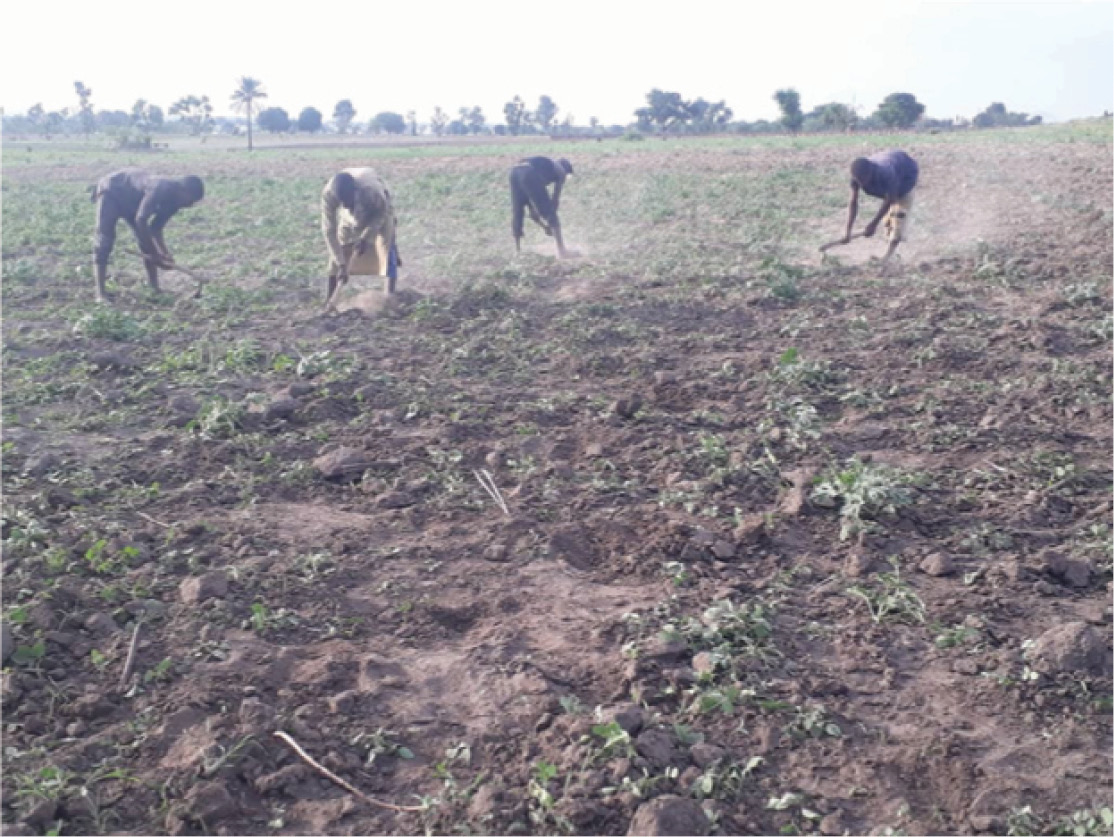COVID-19: Farmers lament lack of access to farm inputs
Farmers in the Federal Capital Territory (FCT) have lamented over lack of access to farm inputs to boost their farming. Some farmers who spoke with Aso Chronicle said they lacked means and access to the market to purchase farm inputs to commence cultivation since the outbreak of COVID-19. A farmer in Dobi, Gwagwalada Area Council, […]

Farmers on a melon farm at Sheda in Kwali Area Council
Farmers in the Federal Capital Territory (FCT) have lamented over lack of access to farm inputs to boost their farming.
Some farmers who spoke with Aso Chronicle said they lacked means and access to the market to purchase farm inputs to commence cultivation since the outbreak of COVID-19.
A farmer in Dobi, Gwagwalada Area Council, Ahmadu Bala, said he had cleared three hectares for cultivation, but that the major challenge was lack of money and unavailability of inputs in the market due to the ongoing lockdown.
Bala said, “I have tried to reach out to my customer in Suleja who supplies me some farm inputs since that of government is not forthcoming, but with this COVID-19 lockdown, farming activities in virtually most villages in Dobi are being threatened,” and added that some farmers in Dobi travelled to Gwagwalada to buy inputs at exhorbitant rates.
Another farmer in Riwaza of Kwali Area Council, Dantani Shagaba, said farmers in the area were also facing lack of access to buy farm inputs as a result of the lockdown.
Shagaba said farmers in the community had cleared lands to commence cultivation but that they had no access to hire tractors.
“Last year some farmers were able to have access to hire tractors, but with the restriction of movement because of the COVID-19 lockdown, no farmer has access to hire tractors for this year’s rainy season.’’
He further said farmers in the area had decided to adopt local farming techniques due to lack of tractors.
In Zukpatu community of Kuje Area Council, a farmer, Ibrahim Adoga, said the lockdown had not affected farmers in the community. “Even before now farmers here in Zukpatu mostly adopt local farming techniques as we don’t wait for government to bring tractors or any farm input to us.”
He said the major challenge farmers faced in the community were incessant attacks by kidnappers which sent fear into the farmers.
The Sarkin Noma (chief of farmers) in Abaji Area Council, Alhaji Muhammadu Dangana, said the continuous lockdown and restriction of movement had been affecting farming activities.
Alhaji Dangana said the move by government to close down inter-state borders was in the right direction but that there was the need for government to also give attention to farmers to have access to farm inputs in order to boost food production.
The FCT Chairman of the Rice Farmers Association of Nigeria (RIFAN), Alhaji Abubakar Dahiru Zuba, said the lockdown had been affecting rice farmers in the territory.
Alhaji Zuba said most of the rice farmers found it difficult to transport their old stock to the market to enable them buy farm inputs to commence cultivation this year.
He said, “Unlike in Niger State, where the state government allows farmers to go and sell their crops for three days here in Abuja, it is not so; which is affecting rice farmers too.”
A farmer in Kuje, Zawali Bulus, said, “This period is very difficult for me because when the first rains came it was our joy to start work on the farms but the lockdown has not let us.”
Bulus said his farmland was far away from where he lived and that he did not want to violate the government’s directives to avoid the spread of the virus.
Another farmer in the area, Mr. Bassey, said he had not encountered any problem since the lockdown because he had been going to his farm to work.
Bassey said nobody had stopped him whenever he was going to the farm, and added that on a certain day he met security men and that when he was asked where he was going, he told them he was going to the farm and he was not delayed.
Mr. Bassey explained that when it came to social distancing, there was no crowd in the farm, and therefore, he saw no reason why people should not go to farm to work.
